Not the Same As the Old Boss
by Rosalie Evans
![]() Meet the New Boss
Meet the New Boss
Not the Same As the Old Boss
by Rosalie Evans
Six who made the leap
share their success stories and offer practical tips
for women and men who would be their own boss
It's Monday morning, time to climb into my corporate straitjacket again. The good news is that I only have to do it for three more days; then I'll be out on my own, working for myself.
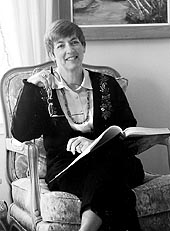 'Look
at her,' my co-workers declare to each other. 'She can't stop smiling!'
'Look
at her,' my co-workers declare to each other. 'She can't stop smiling!'
My joy is transparent. Sighs and envy meet my departure.
'I wish I could afford to do that,' colleagues say wistfully.
'I can't afford to do it either,' I reply, 'but I'm doing it anyway.' Even while I am shaking in my boots, my heart is singing.
Rosalie Evans, at left.
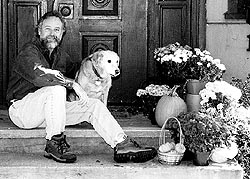 My story is special,
but it's not unique. More and more of us are finding the courage to leave
our regular jobs to work for ourselves.
My story is special,
but it's not unique. More and more of us are finding the courage to leave
our regular jobs to work for ourselves.
Though most employed Americans - a full 91 percent - are wage and salary earners, many dream of 'owning my own business.' But dreaming is different than leaving the medical benefits, the 401K plans and the paid vacations for the uncertainty of self-employment. How do you make the leap to something you love, that makes your heart sing - that matches the definition of "right livelihood" in the Buddhist tradition?
Doug Coulson, right, made the leap in one of the most popular ways. The former director of research for Maryland's Higher Education Commission started his own consulting business, continuing the same work he did as a paid employee. He gained freedom from bureaucracy, creativity and the chance to do more fieldwork.
"I didn't want to sit in my office all day waiting for calls asking questions like 'What is the gender ratio in community colleges?' I wanted to go out and give workshops," Coulson says with a laugh. "The risk is higher but the money is better."
For the last six years, Coulson has survived the risk, prospering as a full-time consultant doing opinion surveys, statistical analysis and evaluations of large educational programs.
Pushed or Pulled
Why do people leave their steady jobs to work for themselves? A common reason, explains Peter Brown in his book Jumping the Job Track, is that their job has been eliminated by the last decade's trends to mergers and downsizing. Other reasons are hitting the glass ceiling, not fitting the culture of the organization, seeking more professional freedom or pursuing a personal vision.
Leeann Irwin, left,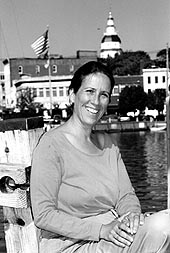 of Annapolis followed her vision of practicing Shiatsu all the way to Japan.
Irwin lived there two years, apprenticing herself to three Shiatsu masters
so she could return to the U.S. and practice "with integrity."
of Annapolis followed her vision of practicing Shiatsu all the way to Japan.
Irwin lived there two years, apprenticing herself to three Shiatsu masters
so she could return to the U.S. and practice "with integrity."
"I enjoyed my previous work but it wasn't how I identified myself and it wasn't a long term vision," she told me.
Irwin, who previously made her living in social work, returned to the U.S. to settle in Chesapeake Country and open her Shiatsu practice in Annapolis. Now, instead of helping people deal with problems through programs and counseling, she helps her clients balance their energy and relax their bodies using the special techniques she learned in Japan.
Carol Bennett of Edgewater dreamed of being a novelist. As a special assistant at NASA, Bennett brought home a six-figure salary. But after 25 years in federal service jobs, she took early retirement to write fictional stories about a gal who works for an aerospace company.
"Once my sons were grown, I stopped knocking myself out for big bucks, opting instead for creative freedom and a meager retirement," says Bennett.
From her past, she brought skills as well as a subject into her future. "Writing regulations and policy on information systems sharpened my skills for writing compelling romance," she says. Dreaming helped her out, too, in developing a style that, she says, "goes beyond conventional concepts of time, space and consciousness."
Sometimes, the decision is made for us. Then all we have to do is let it happen.
For 18 years, Janet Shepherd, of Lusby, planned and managed technical training programs for the U.S. Navy. She wasn't willing to leave her job, but the decline in the defense industry cut her position.
"It happened so gradually that I was able to build up my practice and my confidence that I could support myself," Shepherd explains. "Whether I would ever have been willing to just leave the job would be hard to say. I feel really fortunate because I was segued out gently but firmly."
Shepherd now works full-time as an animal communicator, one who 'talks' telepathically to animals and conveys to their owners information on the health and behavior problems of their pets.
According to career-changing expert Brown, Shepherd, right,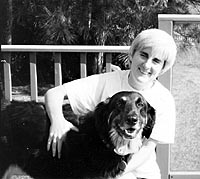 exemplifies a new workplace reality.
Brown claims that the security we think lies in a company job is largely
an illusion left over from our parents' generation.
exemplifies a new workplace reality.
Brown claims that the security we think lies in a company job is largely
an illusion left over from our parents' generation.
"Being able to go out into the marketplace and earn a living without the dressing of a large corporation is one of the best forms of security you can have," Brown claims.
Norman Lowery - who now practices psychotherapy in Chestertown and Annapolis - used to work for the Maryland Department of the Environment tracking water quality. He made the leap at the urging of friends who were therapists and acquaintances who came to him for help even before he had formal training.
"As a child of alcoholic parents," Lowery explains, "I had a very hard life. I started therapy as an adult because I was rigid, overly fearful of risk, very security oriented. That led me to a different, much richer kind of life. I learned so much about growing and healing that I felt a calling to give this gift back."
Lowery went back to school full-time to get a second master's degree, this time in social work, graduating last September. "At my age," he says," I just didn't feel I had the time to wait. Time is more precious to me than money."
Then there's me. Yes, I no longer wear a corporate straitjacket. I'm still a little shaky, but my heart continues to sing. On August 31, 1998, I left my job as a training consultant to open my own business, introducing people to the benefits and techniques of keeping a personal journal.
As word got around that I was leaving, the number of people who shared this desire to go out on their own surprised me. They seemed to assume that I was independently wealthy or had some other secret that made it possible for me to leave - but not them.
I knew I wasn't particularly special, so I began looking for others who had made the leap to find out what we had in common. What preparations did we make? What obstacles did we have to overcome? And most importantly, what can others who want to follow us learn from our experiences?
On Your Mark
There are steps before the final move that can ease the transition. Most of us you've met in this article planned our departure carefully before we actually left our jobs. We explored many alternatives, such as early retirement, leaves of absence and reducing our working hours. Nearly all of us worked part time at our new professions, sometimes for years, before we made it our full-time occupation.
"The practice I got as a part-time consultant," Coulson says, "gave me a sense that I could succeed on my own."
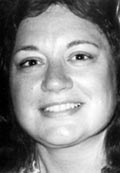 Still, all of
us knew we were going to take a big cut in income - at least initially -
so as we got closer to the actual switch, we took steps to stabilize our
finances and cut expenses. For example, Bennett, at left, paid off her mortgage
and stopped spending.
Still, all of
us knew we were going to take a big cut in income - at least initially -
so as we got closer to the actual switch, we took steps to stabilize our
finances and cut expenses. For example, Bennett, at left, paid off her mortgage
and stopped spending.
"Stressed out at work," she says, "I was always buying something for instant gratification. Now, I refuse to buy anything that isn't functional or that I can't take into my casket."
Lowery liquidated some of his investments and started selling off the antiques he had collected.
I paid off my car, sold my stock option to give me a little nest egg and even gave up the hallmark of my status as a liberated woman: my twice-a-month maid service.
For most of us, cutting back was one of the most difficult steps we had to take.
Lowery speaks for us all when he says, "So much of society is given to the material that when you start to let go of that, it's very scary."
A resource I found helpful in re-structuring my spending habits is the book Your Money or Your Life by Joe Dominguez and Vicki Robin.
"Financial independence is not unlimited riches but just having enough and a little more. It is being free of the fear, fog, and fanaticism so many of us feel about money," the authors explain. "The first step to financial independence is realizing that money is just something you trade your life energy for, then making conscious decisions about what you are willing to trade."
I learned to identify all the monetary expenses directly associated with
my job, like eating out instead of cooking, hiring a housekeeper and someone
to cut the lawn, buying and keeping up the professional wardrobe, plus the
more obvious things like commuting expenses. Using Robin and Dominguez's
worksheets, I was shocked to find that my real wage was less than $10 an
hour. Why should I continue to work at something I didn't enjoy for that?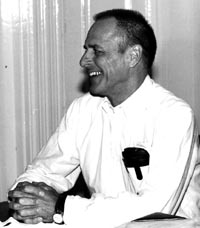
Letting go of material security is easier for some than for others. Irwin was one who found it easy. Says she: "I have always lived pretty simply. Coming back to the states, I found that several of my friends have these huge credit card debts while they have nothing to show for them. If people are going to pursue their dreams, they have to be wise financially."
Gaining the support of your family is important, but not essential. To understand that surprising statement, consider the words of Barbara Sher, author of I Could Do Anything if Only I Knew What It Was.
Sher says, "If you think it is selfish to put yourself first like this, think again, because when you are doing work you love, it is a gift to the world as well."
Seeking family support, Coulson took his 12-year-old daughter off on a canoeing trip to explain what his plans were and to answer her questions. Lowery talked through his decision with his son, who was in college himself at the time, and discussed the options of financing both their tuition bills. I didn't ask anybody, though I did warn my family of what I planned to do.
Support is a tremendous help as we move into unknown territory, and even lukewarm support is good to have. Sometimes, though, others will not understand your choice. They may fear you are taking unnecessary risks. After you have done your best to help others understand how important this decision is to you, you may just have to take a deep breath and do it anyway.
Get Ready
One of our major concerns was finding affordable, adequate medical coverage. "That was a major factor to put into place before I made the leap," agrees Coulson.
Some have been able to retain coverage as part of a retirement package or to piggyback on a spouse's medical plan. A third option is to join an association related to our new business that offers a group medical plan to members. There are some insurance plans for self-employed individuals advertised, but those policies often have significant loopholes and should be examined carefully. The last option is to pay for a private medical insurance policy, which is usually more expensive than a group plan.
Irwin, again, took a different slant. "Health insurance is a really big issue in this country," she agrees, but it's not her way. "Were I to have some degenerative health problem," she says, "my choices wouldn't be what most insurance covers."
Her training in Shiatsu leads her to focus more on preventive care and holistic health remedies than traditional 'get-rid-of-the-symptom' choices that insurance policies typically pay for. So, in a sense, her new career was her insurance.
In the long term, leaving a position you dislike and doing what you love can be a way of improving your health.
"I think your health is much more at risk when you are unhappy in your work. So I think it is sort of health insurance to move and be more your true nature," Lowery notes.
Even when we think we have it all figured out, though, some of us wake in the night with the specter of financial disaster looming over us.
I have minor lapses of faith when I am sure I will end my life as a bag lady. Shepherd initially had visions of herself climbing a huge tree, walking out on a branch and calmly sawing it off behind her. On their canoe trip, Coulson's daughter asked, "Will we be worse off?" He had to tell her honestly that he didn't know, that this was unknown territory.
"I knew I didn't have a lot of cash reserves, so now I had to bring in those contracts!" he explains.
Yep. That's what gets us up in the mornings.
Loss of status and power were concerns of several of us. Bennett says, "I would no longer be that important career person that others envied. Boy, was that all wrong. I had been in such an ego-driven state that I didn't even realize how unimportant I really was back then."
Trading external symbols of status and power for personal freedom and integrity has not been nearly as hard and much more rewarding than we expected. Why?
"Without an activity that really matters to you, you're going to feel empty, even if you've set yourself up in Paradise and are living the life of the rich and famous," writes Barbara Sher. "If you're not involved in something you truly care about, any place can seem like a prison."
Your Turn Next?
So what can you learn from us? Many of us had practiced listening to our intuition over some years before we were willing to trust it.
"About 10 years ago," Lowery says, "I took a big job demotion and pay cut to move from Columbia to Chestertown. It was the first time I took such a risk, when my logic said 'Don't do this.' It was a positive life experience and after that, I trusted my instincts more."
Having taken other risks and gotten positive results, we all have faith that things will work out for the best.
Learning to see the big picture of life is important, too. Seemingly unrelated and sometimes painful experiences often come together to show us that picture.
My focus on journaling as a tool for self-development grew from a hard knot of pain I carried in my heart for several years. I wrote my way out of that pain when all a psychiatrist could offer was a tranquilizer. And my years of being a teacher, my work in building training programs, even my two divorces, all prepared me for this career that I love.
Irwin sees a close connection between her many years of peace activism and her Shiatsu practice.
"Shiatsu is about balancing the various aspects of ourselves. If we are balanced, we can be more flexible in understanding differences and responding to problems. So this is my peace work on a very personal level," she says.
For her, bringing her long-time commitment to peace into harmony with her everyday work greatly outweighs any sacrifices she has had to make.
Making the leap is easier when we can transfer old skills to our new work. Shepherd continues to use problem-solving skills learned in her years of project management to work with her new clients.
"A lot of the work I do is picking up information from the animals and the people and helping them find better ways to understand each other," she says.
She has discovered she can do a lot of things she didn't know she could do and is proud of being self-supporting after only a year as a full-time animal communicator.
Discovering your best qualities and making the most of them is another route to self-employment. Listening to Bennett spin fascinating tales from everyday events tells you she is a born storyteller.
"I have tapped into levels of empowerment and creativity that I never before could have even imagined," she says. Having finished her first novel, Jenny's Reprisal, Bennett is well into her second and working with an agent to find a suitable publisher.
Satisfaction in our new work keeps us at it. Even after six years, Coulson continues to find it exciting to be an independent consultant. He has developed the psychological strength to weather the ups and downs of consulting and to enjoy himself in the process.
"It's not exactly that I don't have a boss. I have 10 or 11 depending on the number of contracts. I just love the diversity. It requires spontaneity and an ability to think on my feet," he explains.
Lowery enjoys working with clients in serious confusion, pain and trouble. Having been in hard places himself, he knows about moving out of them - as well as about being in better places.
"I spend a lot of time going inward and making sure that what I am doing keeps resonating deeply," he says. "Though now I have less materially, in many ways I have more. And my health is better than it's ever been."
Many books will tell you how to go about starting a business. Workshops and seminars will give you financial advice, marketing tips and sales skills. A supportive network of family and friends will keep you going when the going gets hard. All of these are important if you have the itch to go out on your own.
But the crucial aspect of your decision is none of these. What counts is trusting your intuition, your own inner messages and the synchronicities the universe sends you.
How can you tell when you're on the right track? Clues lie not in the logic of the decision, what 'the numbers' look like or even what your bank balance is. Look instead to your energy level, your ability to handle the mundane requirements of your new endeavor with patience and your willingness to sacrifice for what you want.
Do you experience a rush of excitement when you talk about your dream to others? Do friends or family say they've never seen you so energized? Do you respond with calm indifference to people and situations that formerly irritated you? These are signs that you are onto to something good and are building momentum to make your leap.
Rosalie Evans teaches journaling in workshops for self-development. Join her for her next scheduled appearance at YWCA's Woman's Fair at Anne Arundel Community College on March 20. She also writes and distributes a free quarterly newsletter and has just published her first do-it-yourself workshop. Order "Resolving a Relationship: Writing Your Way to Forgiveness and Healing" for $10.45 plus $1 handling: 2123 Laurance Ct., Crofton 21114. Reach Evans at 800/966-0149 or by email at [email protected].
| Issue 3 |
Volume VII Number 3
January 21-27, 1999
New Bay Times
| Homepage |
| Back to Archives |